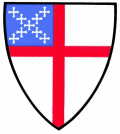This message appeared last weekend in the
New York Times.The Episcopal Church-Marking a Milestone, Moving Forward
.
Somewhere near you, there's a blue-and-white sign bearing the familiar slogan: The Episcopal Church Welcomes You .. It represents some 7,400 congregations that trace their beginnings in North America to a small but hopeful group of English Christians who arrived May 14, 1607 at a place they called Jamestown - the first permanent English settlement in the New World.
.
You may know us as Washington's monumental National Cathedral, site of historic services and ceremonies, or the Cathedral of St. John the Divine in New York, still unfinished, but already the largest cathedral in the world.
.
But the Episcopal Church is also Boston's Old North Church, founded in 1723 and made famous by serving as the beacon for Paul Revere's revolution-spurring "midnight ride." And Philadelphia's Christ Church, home parish of 15 signers of the Declaration of Independence, host to the first General Convention of the Episcopal Church in 1785.
.
It's Trinity Parish on Wall Street in New York, formed in 1698, and St. Paul's Chapel just down the street, frequented by George Washington and the spiritual healing center of Ground Zero since September 11, 2001.
.
It's also Epiphany Church in Los Angeles, where Cesar Chavez rallied the United Farm workers. And Emmanuel Episcopal Church in Cumberland, Maryland, whose basement was a major stop on the Underground Railroad to freedom for enslaved African-Americans. And St. John's Church in Greenwich Village, a meeting place for gay and lesbian action following the 1969 Stonewall uprising.
.
It's a parish in Iowa. A campus ministry in Georgia. A mission in Dinetah - the Navajo Reservation. A cathedral in Utah. Even a house church in Vermont.
.
Wherever you find us, you'll find the Book of Common Prayer and a Christian faith that honors and engages the Bible, the tradition of the Church, and God-given human reason. Joined in prayer, you'll find people with many points of view - Christians who are progressive, moderate, and conservative - yet who value the diversity of their faith community.
.
That's a heritage drawn from our deep roots in nearly 2,000 years of English Christianity, and shared by a worldwide Anglican Communion that unites nearly 80 million people in 164 countries through prayer and ministries committed to caring for "the least of these," as Jesus commanded, by reducing poverty, disease, and oppression.
.
Episcopalians struggle with the same issues that trouble all people of faith: how to interpret an ancient faith for today ... how to maintain the integrity of tradition while reaching out to a hurting world ... how to disagree and yet love and respect one another.
.
Occasionally those struggles make the news. People find they can no longer walk with us on their journey, and may be called to a different spiritual home. Some later make their way back, and find they are welcomed with open arms.
.
Despite the headlines, the Episcopal Church keeps moving forward in mission - in all 50 U.S. states and the District of Columbia, as well as congregations in Belgium, Colombia, the Dominican Republic, Ecuador, France, Germany, Guam, Haiti, Honduras, Italy, Micronesia, Puerto Rico, Switzerland, Taiwan, Venezuela, and the Virgin Islands.
.
We're committed to a transformed world, as Jesus taught: a world of justice, peace, wholeness, and holy living. We've grown a lot in 400 years, since that 1607 worship service from the Book of Common Prayer was held in Jamestown-inside and out.
.
Come see for yourself. Come and visit. .. come and explore ... come and grow.






















